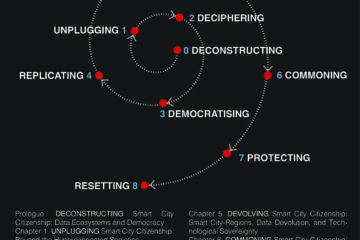Impacts of the COVID-19 Pandemic on the Water-Energy-Food Nexus
In a recently published journal article, we argue that there is a pressing need for a systemisation of the impacts of COVID-19 on water, energy and food security. We also explore the tangible impacts of the pandemic, including negative aspects, like increase in medical waste, and positive aspects, like some improvements in air quality and carbon emissions. The COVID-19 pandemic offers an opportunity to examine the impacts of system-wide crises on key supply sectors, such as water, energy, and food. These sectors are becoming increasingly interlinked in environmental policy-making and with regard to achieving supply security. Now, there is a pressing need for a systematization of impacts and responses beyond the disruptions on individual supply sectors. Specifically, this paper provides …
OxPol Blogcast Episode 4: Mexico’s Midterm Election
Welcome to the OxPol Blogcast, a podcast where we will be sharing research, analysis, and experiences from members of the University of Oxford’s Department of Politics and International Relations. On each, episode we will talk to a guest about a piece they’ve written for the OxPol Blog. Then, we’ll discuss their larger research agenda, their insights on conducting political science, and their time at Oxford. On this episode of the OxPol BlogCast, host Chase Harrison talks to DPhil student Javier Pérez Sandoval about Mexico’s upcoming midterm election, theories of voter choices, and analysing democracy at the subnational level. Read the original blog post here: https://blog.politics.ox.ac.uk/a-return-to-the-right-for-mexico-foucaults-pendulum-and-missed-political-opportunities/ Views expressed on this podcasts are those of the guests alone and are not representative of …
A Return to the Right for Mexico? Foucault’s Pendulum and Missed Political Opportunities
In June 2021, amidst the COVID-19 pandemic, Mexico will face what is bound to be one of the most complex mid-term elections the country has seen in the last two decades. At stake is control of 15 (out of 32) governorships, 30 state legislatures, 1,900 municipalities and a complete renewal of the Lower Chamber of Congress. The outcome will clearly be either a punishment or a reward for the leftist administration of Andrés Manuel López Obrador (AMLO) and the ballots cast this summer will undoubtedly make or break the second half of his presidency. The extent to which the COVID-shock has impacted individual political preferences in Mexico remains unclear. Looking at the most recent available data to conduct an exploratory …

Smart City Citizenship: A Techno-Political Review (of Cities and Nations)
COVID-19 has hit European citizens dramatically, not only creating a general risk-driven environment with a wide array of economic vulnerabilities but also exposing them to pervasive digital risks, such as biosurveillance, misinformation, and e-democracy algorithmic threats. Over the course of the pandemic, a debate has emerged about the appropriate techno-political response when governments use disease surveillance technologies to tackle the spread of COVID-19. Citizens have pointed out the dichotomy between state-Leviathan cybercontrol and civil liberties. Moreover, the giant technological flagship firms of surveillance capitalism, such as Google, Amazon, and Facebook, have already assumed many functions previously associated with the nation-state, from cartography to the disease surveillance of citizens. But particularly, amidst the AI-driven algorithmic disruption and surveillance capitalism, Smart City Citizenship sheds light on the way citizens …

Recovering from SolarWinds: Three Cybersecurity Priorities for the Biden Administration
Since January 20th, the Biden administration has been focused above all else on tackling Covid-19 and passing a landmark economic relief bill. This is unsurprising. In the context of a global pandemic, with an urgent vaccine rollout taking place, the US government must prioritise tackling Covid-19 and its economic consequences. However, President Biden has a raft of additional problems waiting at his doorstep. In particular, the US faces a two-pronged cybersecurity crisis: the impact of a vast cybersecurity breach known as the SolarWinds attack that was likely perpetrated by Russian intelligence, coupled with the fallout from Trump’s ‘legacy of cyber confusion’. This leaves Biden with three tasks. First, he must deal with the immediate consequences of SolarWinds: identifying what data has been compromised and doing everything possible to patch exploited systems. Next, he must hold Russia accountable …
Covid-19 and Prison Populations: the case for priority vaccine allocation
As we enter 2021 and the Covid-19 pandemic rumbles on, optimism for the coming year relies heavily on successful vaccine rollout. Attention is now increasingly focussed on the practicalities of distribution, which will involve prioritisation and difficult policy decisions. Few argue about those groups right at the top of the list like care home residents, or healthcare staff working in high risk settings. However, an important population is less on the radar: people in prison. There are around 11 million people in prison around the world. Most will be in environments that make social distancing and other measures to reduce transmission, now a routine part of day-to-day community life for most, much more challenging. Such conditions can make prisons vulnerable …

OxPol Blogcast Episode 3: Drug Legalisation Referendums
Welcome to the OxPol Blogcast, a podcast where we will be sharing research, analysis, and experiences from members of the University of Oxford’s Department of Politics and International Relations. On each, episode we will talk to a guest about a piece they’ve written for the OxPol Blog. Then, we’ll discuss their larger research agenda, their insights on conducting political science, and their time at Oxford. On the 3rd episode of the OxPol BlogCast, host Chase Harrison talks to recent DPhil graduate Jonas von Hoffman about the results of recent drug legalisation referendums in the United States. We compare those to legalisation movements across the Americas before chatting about his experience studying a more taboo topic in academia.
Biden, López Obrador and the politics of migration: a return to the status quo?
Joe Biden’s presidential victory has brought temporary relief for many undocumented and mixed-status families in the US. Biden promised to reverse several of Trump’s executive orders on immigration and refugee policy within his first 100 days in office including reinstating the Deferred Action for Childhood Arrivals (DACA) program, ending the Migrant Protection Protocols (MPP) also known as “Remain in Mexico,” and creating a “road map” to citizenship for the approximate 10.5 million undocumented immigrants in the US. While Biden’s immigration agenda contains federal and local level priorities, little emphasis has yet been placed on the bilateral scale with the US’s southern neighbour, Mexico. Yet, bilateral immigration negotiations should be a priority for administrations on both sides of the border. In …









